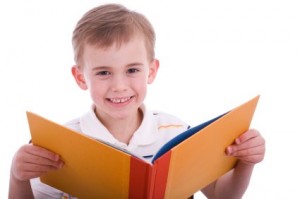
Looking for fun ways to keep the kids busy and learning over the cold, wet weekends. Why not try some books and puppets.
Sharing a book with a child is a calming and bonding way to help your child learn. Babies love books they can touch and explore such as flap books or ones with bright colours, familiar pictures or textures to explore. Toddlers love simple action stories with repeated lines or rhyme. Preschoolers begin to love books with real “stories”.
Stories have a predictable structure; with a beginning, middle section where a problem usually occurs and ending where it all works out. Understanding this structure helps children read, comprehend and write. Kids learn this structure by hearing lots of different stories. Mem Fox in her book “Reading Magic” suggests reading three stories each day, a new one, a familiar one and a favourite that has been heard many times.
You can also help your child’s language development by discussing the story and pictures as you go. Young children can answer “what” and “where” questions while older children are challenged by more complex questions such as “Why do you think..?”, “How can you tell….?” or “What will happen next?”
Children can’t usually read at their level of understanding until around 10 years of age so keep aloud reading to your children even after they begin to read themselves. Good quality children’s novels can be a great way to share time with older children. If you're not sure what is good for your child’s level ask your local librarian to recommend some books your child may like.
For reluctant readers try making your own books, by hand or on the computer, using a digital camera, Google images or clip art to illustrate. Some children enjoy non fiction books about topics they are interested in. Libraries and bookshops often have kids activities which are free or inexpensive to help kids get into reading. Borrowing a library book is free so why not visit your library today or even make it a regular part of your family routine. Second hand bookshops and op shops are an inexpensive way to collect books to keep.
Kids love puppets and they can be a fun way to develop language skills and pretend play. You can make your own puppets very cheaply with items from around the house. Make them as simple or as complex as you like, depending on your time and your child’s concentration span. Make them represent characters that interest your child such as their favourite animal, story or movie characters or even a favourite football player. As you make the puppet young children can learn the names of body parts while older children can talk about facial expressions or make a procedure, using step by step photos as they make their puppet.
With very young children a simple puppet can appear, disappear and reappear from behind a box, cushion or even your back and practice words such as “boo” or greetings “hi” and “bye”. Older children can help you make a puppet or two and act out a favourite story, song or rhyme or even make up their own story. Why not get a box from the supermarket and make a puppet theatre. You can video or take photos of the story as your children act it out and make a book or movie to keep.
Here are some cool websites with fun but inexpensive ideas for making puppets with kids.
http://familycrafts.about.com/od/puppets/tp/Puppet-Crafts-For-Kids.htm
http://www.play-script-and-song.com/easy-to-make-puppets.html
We hope you have lots of fun together.
Related Blog Posts
If you liked this post you may also like:
10 speech tips
Book Week, more than the costume!
Speech development
Using barrier games



